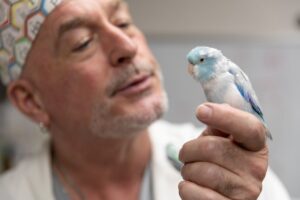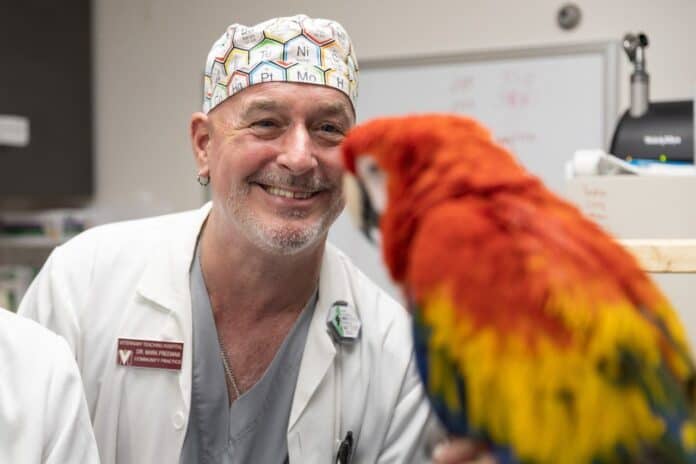While the Veterinary Teaching Hospital‘s primary focus is treating domestic dogs and cats, the Virginia-Maryland College of Veterinary Medicine finds avenues to help many other kinds of animals
The student-run organization, ZEW club, is an essential part of the care and treatment of wildlife presented to the hospital.
ZEW stands for “Zoo, Exotic Pet, and Wildlife Medicine Club” and the club is comprised of students with a passion and interest for these nontraditional species.
The club brings in guest speakers, conducts hands-on learning sessions, and otherwise provides educational opportunities to enhance student learning on wildlife and exotic pets.
Students who want more direct involvement can apply to join the Wildlife Ward, a subset of the ZEW Club.
The Wildlife Ward is comprised of ZEW Club members who wish to be hands-on with some of these species, and who have passed a quiz demonstrating knowledge in the handling and treatment of specific animals.
The volunteers also receive hands-on training via a wet lab each fall hosted by the Southwest Virginia Wildlife Center. Additionally, the coordinators receive further hands-on training, including completion of the National Wildlife Rehabilitators Association’s “Wildlife Medicine Course for Veterinary Students”.
When a wild animal, such as an injured wild bird, is brought to the hospital, the Wildlife Ward members, with the direction of a veterinarian, assist with triage (initial assessment and stabilization) until it can be safely transported to the Southwest Virginia Wildlife Center in Roanoke, where an experienced wildlife veterinarian awaits. This club helps students learn more about treating wildlife and helps the community by helping injured wildlife in the area.
Noah Goldfarb, a Class of 2026 DVM student and current president of Wildlife Ward, feels strongly that this club fills a vital niche in this area.
“There is limited wildlife support in this area,” Goldfarb said. “There are two options in Roanoke, but with that being an hour away, we field so many calls, and we do our best to take as many as we can.”
The primary goal of Wildlife Ward is triage and stabilization. Students will take in injured or sick wildlife and initiate treatments that can be lifesaving and keep them as comfortable as possible until they can be transported to Roanoke by volunteers or a coordinator.
Coordinators have a year or more of experience with wildlife at the veterinary college. Volunteers are those in the Wildlife Ward with less experience in wildlife and thus are always paired with a coordinator if seeing an animal. The variety of positions allows for a well-rounded opportunity for students to engage and complete a public service for animal welfare.
“It’s great from a student perspective to work with nontraditional veterinary species and to come up with basic treatment plan for any year student,” Goldfarb said. “We also work with the undergrad pre-vet club and other wildlife clubs to facilitate transport and involve them even though they are not permitted to be involved in the veterinary care”

Reflecting on his time as the Wildlife Ward president, Goldfarb remembers the impact he’s had on people over the years.
“One time a child brought in an injured chipmunk, and he was so worried for the chipmunk that he was going to die,” Goldfarb said. “I was able to talk to him about how the chipmunk needed a little bit of rehabilitation but soon would be back in his backyard. I’ll never forget the smile on his face.”
The Wildlife Ward is even known by local wildlife control officers, game and fish officers, and local animal control, which all will sometimes send cases to the school, especially after-hours when other wildlife centers aren’t available.
As Goldfarb moves on to clinics, he looks to the newer veterinary students to continue the work of Wildlife Ward.
Alex Brewer, a first-year veterinary student and first year Wildlife Ward coordinator, joined to help round out his education.
“From Wildlife Ward I’m gaining clinical and critical care experience early in my vet school career,” Brewer said, “as well as getting the ability to work with wild animals that I’d never be able to work with otherwise.
“I think it’s really cool to be able to help these animals that wouldn’t have anywhere else to go, so it makes me feel like I’m making somewhat of a difference in their lives”.
Both Goldfarb and Brewer share the same hopes for Wildlife Ward.
“I wish more people knew of the Wildlife Ward in general and what we do for the animals that we see,” Brewer said. “We help as many as we can, and we do our best to support the community.”
Some veterinarians in the hospital have immense interest in these types of animals, despite choosing other specialties for board certification, and play a vital role in supporting the Wildlife Ward
Mark Freeman, clinical associate professor in Community Practice (CPRAC), sees exotic species and even occasionally sees pet birds and “pocket pets” through appointments.
Freeman enjoys being able to make a difference in a variety of species’ lives. He chose to pursue general practice full time because he likes the variety, and thus isn’t boarded to see wildlife, but he does his best to help any animal that is brought in.
“Board-certified wildlife veterinarians are difficult to find because there aren’t many of them,” Freeman said. “Board certification with the American College of Zoological Medicine entitles a veterinarian to treat most species of wildlife, but there are not a lot of them out there. This makes it hard to get those types of animals seen.”
He said that Wildlife Ward does an incredible job of recognizing zoonotic diseases and using proper personal protective equipment and biosecurity to protect other animals and people in the hospital.
“Even if Wildlife Ward was never advertised, wildlife will always show up at the hospital door,” Freeman said, “so it’s invaluable to have veterinarians who are willing to support students that are helping to triage these animals.”
Written by Lauren Maghak, third-year DVM/MPH student, for the Virginia-Maryland College of Veterinary Medicine


